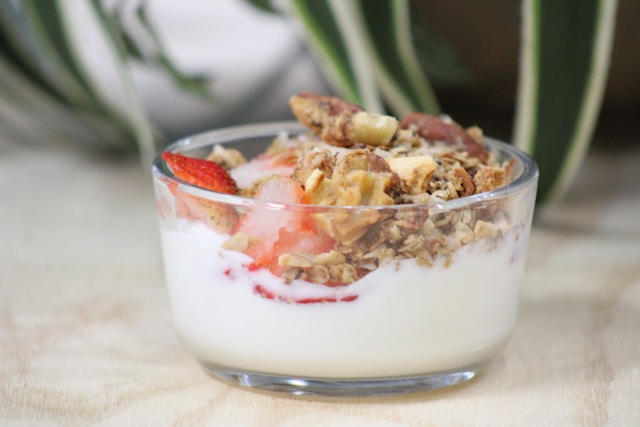For years, I believed the wellness world’s mantra: if you’re bloated, you just need a probiotic. That was the message repeated in beauty magazines, at health food stores, and across social media. It seemed so simple.
But after three decades of navigating my own gut journey—managing the effects of antibiotics, healing two C-sections, and now supporting women through midlife and beyond—I’ve learned something different. Probiotics aren’t magic powders and pills. And they’re not all created equal.
Gut health is bigger than a capsule. And it’s deeply personal.
What Are Probiotics, Really?
Probiotics are living microorganisms—tiny bacteria that live in and on us. We actually have more bacteria than human cells. While we have multiple microbiomes throughout the body (on our skin, in our mouth, even in our lungs), the gut houses the largest collection.
When these bacteria are in balance, they play a critical role in supporting digestion, immunity, hormone regulation, blood sugar regulation, and even mood. However, when the balance shifts—whether due to stress, antibiotics, hormone fluctuations, or major life changes—we start to notice symptoms, including bloating, constipation, cravings, foggy thinking, infections, and blood sugar fluctuations.

The catch? Not every probiotic stays in the gut, and research shows their benefits are highly individual—what works for one person may do nothing for another (Nature Medicine, 2019).
When Balance Shifts: Stress, Hormones & Life
Your gut doesn’t live in a vacuum. It shifts with you—through seasons of life changes, hormones, surgeries, viruses, and even how you handle stress.
- Younger women often notice gut changes tied to their cycles or while on birth control.
- New moms may discover new sensitivities after pregnancy or a C-section, especially if antibiotics disrupted the microbiome.
- Perimenopausal women suddenly feel bloated, foggy, or gain weight seemingly overnight as estrogen and progesterone begin to fluctuate.
- Menopause alters not only reproductive hormones but also gut rhythms and elimination, which ripple out into other microbiomes across the body.
Science backs this up: as estrogen declines during perimenopause and menopause, the gut microbiome shifts too—leading to symptoms like bloating, weight changes, and brain fog (PubMed, 2022).
Add lack of nutritional education as the Secretary of Health and Human Services declares that nutrition is now required in medical school after 80 years, compounded with chronic stress and compiled with lack of sleep in a 24-hour culture, you have a recipe for digestive system struggles even more. Cortisol rises, digestion slows, blood sugar swings, and the body falls out of its natural “rest and digest” state. At that point, probiotics alone rarely solve the problem.
Brain Fog & the Gut Connection
That heavy, cloudy feeling that makes it hard to concentrate? It often begins in the gut. Hormone shifts alter the microbiome, and when the gut becomes inflamed, the brain receives unclear signals. Add in poor sleep, constant stress, highly processed food, and environmental toxins, and both digestion and mental clarity take a hit.

This isn’t just anecdotal. Multiple studies confirm the gut-brain connection: when the gut is inflamed, the brain can feel foggy and fatigued too (PubMed, 2019; PubMed, 2021).
This is why simply adding a probiotic doesn’t clear brain fog and bloating. Unless stress, sleep, nutrition, blood sugar, and hormone balance are addressed together, probiotics cover only a fraction of what the gut and brain truly need.
Probiotic Foods, Prebiotics & Fiber
It’s important to remember that supplements aren’t the only way to get probiotics. Fermented foods—like sauerkraut, kimchi, kefir, and yogurt—provide natural sources. Yet probiotics can’t thrive on their own. They need prebiotics, the fibers that feed them, to flourish.
Prebiotics show up in everyday foods like whole grains, beans, onions, garlic, and leeks. But not all foods work for everyone. Some women thrive on high-fiber whole grains, while others with celiac disease or gluten sensitivity experience flare-ups. This is why a personalized approach matters so much: what feeds one woman’s gut diversity might cause others to bloat or feel fatigued.
The fascinating part? When we eat the right fibers, our gut bacteria transform them into short-chain fatty acids. These compounds don’t just support digestion—they also help regulate blood sugar, appetite, and even boost natural GLP-1 production. This is the very hormone that popular weight-loss drugs target, but your body can support it naturally through the right foods (PubMed, 2015; MDPI, 2022).
Why Probiotics Alone Aren’t the Answer
Probiotics can be helpful, but they’re not the end game.
- Certain strains are used short-term for infections or gut overgrowth.
- Others may support natural GLP-1 production, which helps regulate appetite, weight, and blood sugar.
- Still others help maintain diversity once the microbiome is already balanced.

But real, lasting healing? It requires more. Rebuilding the gut lining, testing the microbiome to address specific imbalances, as we are all created equally but metabolize differently, regulate blood sugar differently, have different stress levels, and findings when it comes to the right foods for your body are what truly restore balance.
GLP-1 Medications vs. Natural Support
GLP-1 medications (like Ozempic® or Wegovy®) have taken the world by storm. They can be effective in the short term for regulating blood sugar and weight, but they come with very real risks—nausea, digestive disorders, muscle loss, and potential long-term dependency.
Your body, however, already produces GLP-1 naturally. By supporting your gut with targeted probiotics, nourishing fibers, quality proteins, and sustainable lifestyle changes, you can encourage your body to do what it was designed to do—without the side effects. This isn’t about overriding your body’s wisdom. It’s about working with it.
What Truly Helps
Gut health isn’t about taking more supplements or injections. It’s about creating balance in the body, cultivating sustainable lifestyle habits, and fueling your metabolism, the exact process of turning food into energy as God intended for us to nourish our bodies. Here is a root cause approach to unravel the bloat and brain fog:
- Test, don’t guess: Functional labs can uncover if probiotics are even needed—or if your imbalance is bacterial, fungal, environmental, metabolic, or hormonal.
- Find the right foods for you: If meals leave you inflamed or uncomfortable, your gut may be signaling sensitivities unique to you.
- Balance blood sugar: Meals that combine protein, healthy fats, and fiber help keep insulin and support GLP-1 production.
- Prioritize rest & stress support: Without quality rest, your gut lining can’t repair itself.
- Reduce toxin exposure: Plastics, processed foods, seed oils, heavy metals, and environmental chemicals all can disrupt gut bacteria and hormones more than most realize.

Ready to Go Beyond Probiotics?
If you’re still feeling bloated, gaining weight, fluffy, foggy, or just “off,” it’s not about adding another supplement to your shelf after seeing a promising ad to be the one thing to a flat tummy. It’s about uncovering why your gut and hormones are out of balance—and then creating a plan to restore your body’s natural rhythm.
Schedule your Gut Wellness Screening today to finally get to the root cause, discover what your body truly needs, and experience fueled energy with food, better digestion and metabolism, and a personalized plan to finally step into true gut health balance.
Co Author: Alyssa Young



+ show Comments
- Hide Comments
add a comment